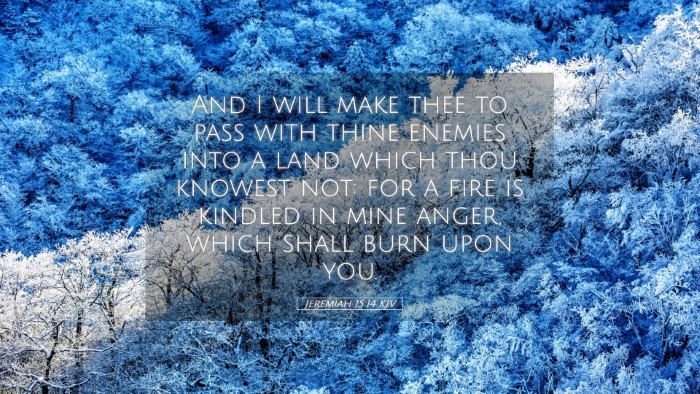Commentary on Jeremiah 15:14
Verse: "And I will make thee to pass with thine enemies into a land which thou knowest not: for a fire is kindled in mine anger, which shall burn upon you."
Introduction
The verse in question, Jeremiah 15:14, arises from the context of Jeremiah's prophetic ministry during a tumultuous time for the people of Judah. This commentary synthesizes insights from notable public domain commentaries by Matthew Henry, Albert Barnes, and Adam Clarke, aiming to present a comprehensive understanding of the text, particularly for pastors, students, theologians, and Bible scholars.
Context and Background
The Book of Jeremiah is situated within the larger narrative of the Old Testament, detailing the calls to repentance amidst impending judgment. Jeremiah, known for his poignant laments and prophetic declarations, frequently addressed the disobedience and idolatry of Israel, offering both warnings and hope. In chapter 15, the prophet is reflecting upon the severe judgments that are to come upon the people due to their persistent rebellion against God.
Exegesis of Jeremiah 15:14
This verse can be dissected into key elements for deeper analysis:
- The Divine Judgment: The phrase "I will make thee to pass with thine enemies into a land which thou knowest not" indicates a divinely sanctioned exile. God’s punishment results in the displacement of His people, suggesting a lost covenantal identity and a severing of their relationship with the land promised to them.
- The Unknown Land: The "land which thou knowest not" signifies unfamiliarity and abandonment. This evokes the missed opportunities and blessings God had provided, establishing a stark contrast between their current life and their forthcoming estrangement.
- The Nature of God's Anger: The concluding remark "for a fire is kindled in mine anger, which shall burn upon you" employs evocative imagery of fire, embodying God's wrath as passionate and consuming. This vivid metaphor serves as a warning of the imminent divine retribution that is both inevitable and severe.
Theological Implications
Jeremiah 15:14 not only reflects prophetic judgment but poses extensive theological implications regarding sin, God’s righteousness, and the seriousness of divine anger:
- Sin and Consequence: The passage serves as a reminder of the consequences of sin. Henry emphasizes that continued disobedience to God leads to dire repercussions, and the suffering of God's chosen people is often reflective of their disloyalty.
- God’s Sovereignty: Albert Barnes outlines the sovereignty of God in the way He orchestrates the history of nations, declaring that what is foreshadowed in prophetic messages reflects His supreme control over all peoples, not just Israel.
- Promise Amidst Judgment: While God’s anger is evident, there is always a thread of hope for restoration threaded throughout Jeremiah’s messages. Clarke points out that God’s ultimate goal transcends punishment; it is meant to bring about repentance and, subsequently, redemption.
Pastoral Application
The implications of Jeremiah 15:14 extend to today’s believers, yielding profound lessons and applications:
- Call to Repentance: This verse challenges contemporary readers to self-examine their lives concerning sin and encourage others toward genuine repentance. There remains a critical need to align one’s life with God’s will and standards.
- Understanding God’s Discipline: Just as God dealt with His people, pastors and leaders can find guidance in understanding the nature of divine discipline. This serves to advise congregations that struggles often arise from deviations from God’s path.
- Hope in Adversity: Even amidst judgment, the understanding that God's character aligns with justice yet is ultimately restorative can provide solace and encouragement for believers facing trials. They are urged to foster a perspective that acknowledges God's larger plan of redemption.
Conclusion
Jeremiah 15:14 carries a powerful message about the nature of God’s judgment and the call to remain faithful to His covenant. As this commentary illustrates, the insights from Matthew Henry, Albert Barnes, and Adam Clarke enable us to grasp the profound meanings encapsulated in this verse, enriching our theological discourse and practical application of Scripture.


